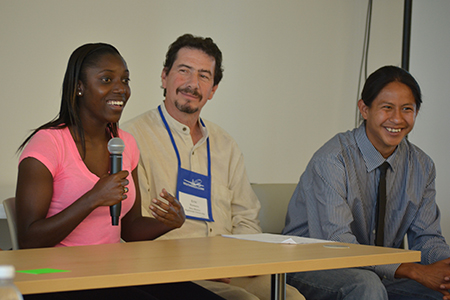
Margaret McKinney/Highlands University
Highlands University student Shanice McPherson, a Jamaican, speaks on the student panel at the Diversity Summit at the university June 8 – 9. At the right are Eric Romero, languages and culture professor and panel moderator, and Highlands student Rydell Chee of the Navajo Nation.
Las Vegas, N.M. – Supportive faculty and staff at Highlands University are critical in helping students from diverse background overcome challenges and succeed academically, said student panelists at the Second Annual Diversity, Equity and Inclusion Summit.
Lilian Roman, a Highlands social work graduate student who earned her BSW at the university, talked about persevering with her education while facing the adversity of being undocumented. She is from Chihuahua, Mexico.
“Being undocumented, I feel like I probably would have been stuck in the shadows without the support and input from faculty like Dr. Eric Romero and staff at Highlands,” Roman said. “Through all the struggles, including some students’ parents being deported, people at Highlands helped me and other undocumented students get through our school years and graduate. I’m so thankful.”
Roman is an activist for other undocumented students through leadership positions in organizations like MEChA de NMHU (Movimiento Estudiantil Chicano de Aztlan).
Highlands co-sponsored a higher education diversity summit June 8 – 9 with the University of New Mexico. UNM’s Division for Equity and Inclusion established the first Diversity Summit in 2014. This year, 18 New Mexico universities and colleges participated as well as Diné College on the Navajo Nation with its main campus in Tsaile, Arizona and two sites in New Mexico.
Teresita Aguilar, provost and vice president for academic affairs at Highlands, worked with Josephine De León, UNM vice president for equity and inclusion, to develop the Diversity Summit this year.
Rydell Chee, a human performance and sport senior from the remote rural community of Naschitti, New Mexico on the Navajo Nation, talked about overcoming the initial culture shock when he came to Highlands.
“I was encouraged to get involved with the Native American Club, which helped with the loneliness, my shyness, and maintaining my cultural identity,” Chee said. “I have received a lot of encouragement at Highlands and once I got confident, I knew I’d succeed academically.”
Chee plays for the Highlands Vatos Rugby Club that took home a first-place title in May at the National Small College Rugby Organization National Championships in Philadelphia.
“Our rugby team shows strength in diversity and we’re all shades of skin color. We’re from Texas, Mexico, Virginia, California, Samoa and the Navajo Nation,” Chee said.
Also on the panel was Alma Rivera, a graduate student in educational leadership at the Highlands Santa Fe Center who is the ENLACE coordinator at Santa Fe Community College. ENLACE is a statewide educational initiative that works to increase higher education opportunities for Latino students.
The last student speaker was Shanice McPherson, a human performance and sport senior from Jamaica and five-time All American in long jump, including two national championships. McPherson helped the Cowgirls track and field team win a third place trophy at the NCAA Division II Championships in May.
Eric Romero, Highlands University languages and culture professor, moderated the student panel.
“All these Highlands students are talking about the importance of cultural identity, empowerment, tenacity and finding communities of support at college,” Romero said. “One of the biggest challenges facing higher education institutions today is to tap into deep-rooted cultural identity and knowledge to help truly transform these institutions.”
In 2014, Aguilar established a 19-member Diversity Council at Highlands in partnership with faculty and staff. Romero chairs the Diversity Council.
“The goal of the Diversity Council at Highlands is to provide direction and recommendations to the campus community to address diversity in a meaningful way that has a positive impact on students,” Aguilar said. “We’re preparing our students for a diverse global society and we need to build on providing academic, extracurricular and field-based opportunities to increase cultural understanding and competency.
“The most important outcome for this diversity summit is to reinforce the statewide network of higher education institutions and our commitment to diversity,” Aguilar said.
DeLeon said: “We had a very robust, dynamic discussion at this diversity summit and shared best practices. Dr. Aguilar put together an incredible agenda that addressed some of the most central topics in diversity in higher education such as diversity requirements in curriculums for students.”
